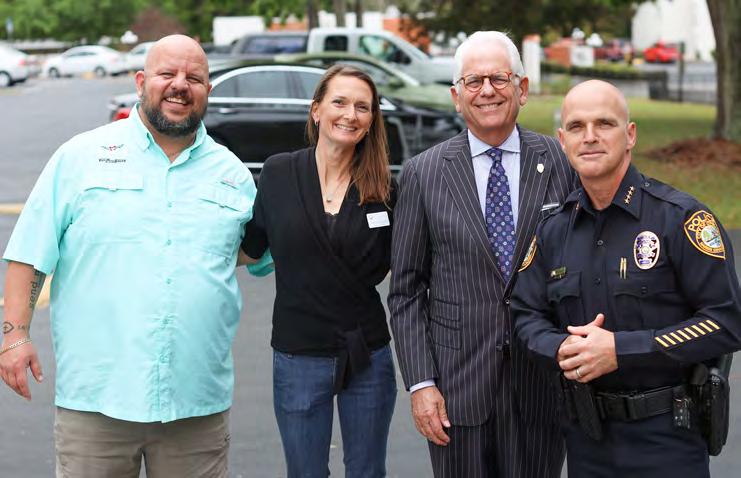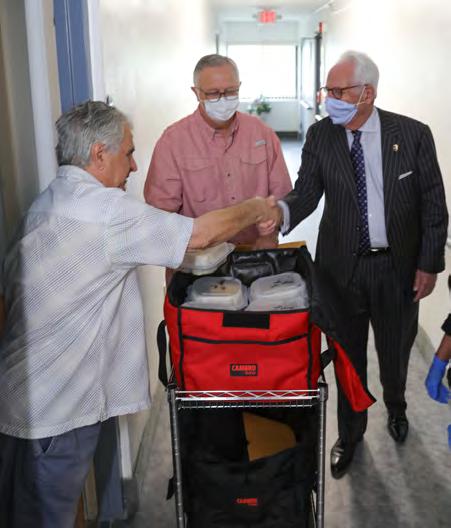
5 minute read
Charity Spotlight: Delivering Meals and
from Ocala Magazine April 2021
by ocalamag
Delivering Meals and Companionship
Meals on Wheels has expanded during the pandemic
Advertisement
BY CARLTON REESE | PHOTOGRAPHY BY RALPH DEMILIO
For some elderly and infirm, the entire universe may as well be 1,000 square feet enclosed in drywall and dated paper. The few voices that interrupt the day’s silence come mostly from the television set or the AM/FM radio that also serves as an alarm clock.
At some point in the early afternoon the doorbell rings and a little life leaps into a barren day. On the porch awaits a volunteer for Meals on Wheels, delivering not just a hot lunch to a needy and immobile client but also some heartfelt companionship that goes a long way to enhancing one’s quality of life. One of the core programs at Marion Senior Services, Meals on Wheels serves nearly 73,000 meals to over 500 clients a year and along the way delivers hope with a hot meal.
“We just want people to know they’re not forgotten,” said Jenny Martinez, Executive Director of Marion Senior Services. “It’s making sure they know and understand there are people out there that know them and love them and want them to do well. It gives them purpose.”
In 1973, several local women concerned about their neighbors took a $100 check from Blessed Trinity Catholic Church and began delivering meals to homebound seniors. From that small beginning grew MSS and the local Meals on Wheels program that started in England during the German bombing campaigns early in World War II.
With nutritionists and dieticians overseeing the preparation of all meals, homebound seniors in Marion County are able to receive one-third of their daily nutritional requirements through the delivery of lunch, something nearly all would have otherwise been deprived.
Rondo Fernandez, Jennifer Martinez, Mayor Kent Guinn and Police Chief Mike Balken
The meals arrive via volunteer or MSS staff member and looks much like a traditional TV dinner, but healthier. In some cases, according to Martinez, the meals replace ketchup packets and water. In such cases, pride gets in the way of the necessary inquiries into services.
“They don’t want to burden anybody,” Martinez said. “They don’t want to make their problems somebody else’s so they try to maintain themselves and that usually doesn’t work. We’re very honored to be able to help these people.
“Our whole mission is to keep seniors independent and in the home as long as possible. There’s no place like home – it’s not just a slogan.”
With the onset of the pandemic, the efficiency and volume of Meals on Wheels has been tested like no other time before. Martinez and her team certainly anticipated a greater demand from clients, but also feared a depletion of volunteer forces which, like most charitable operations, are its lifeblood. As most volunteers are seniors themselves, it was believed fears of COVID would ultimately keep many from their usual rounds.
To Martinez’ surprise, the volunteers and staff at MSS actually increased their vigilance, enabling a continuation of the services.
“(The volunteers) all showed up,” Martinez said. “They even took it more to heart that they remain consistent, that they didn’t want a stranger going to their (appointed) houses because in a scary time we have been in they didn’t want to add in another layer of the unknown. They came out and continued their mission.
“It was really warming for me as an exec-


utive director to have my staff and volunteers just really take it to heart and not want to give their responsibilities to someone else.”
With the negative effects of the pandemic also came an opportunity for Meals on Wheels to expand, which it has done with the help of local restaurants and the governor’s relaxing of restrictions on home meal deliveries. What has ensued is the Warm Meals program in which MSS volunteers are able to deliver meals from area restaurants such as Mojo’s in Ocala, County Line Barbecue in Ocklawaha, Pappy’s Place in Anthony and Sonny’s Barbecue near Marion Oaks. Before the pandemic, such services would not have been allowed in a Meals on Wheels program, but now such expansion that has sprung forth a win-win for all involved. “(Demand) is up over 300 percent and our purveyor was completely overwhelmed,” Martinez said. “We were blessed that our governor allowed us to use restaurants as emergency purveyors where we can help our more vulnerable people so that they might get two meals a day now.”
Martinez says that all meals are still being approved by a nutritionist and dietician, but that much of the bureaucracy has been lifted, allowing for a more flexible and creative program. Marion Senior Services negotiates a contract price with the restaurants with a reimbursement rate, creating a situation where less money is paid up front that allows more people to be served on the back end.
“The restaurants are being very generous with us and we are actually able to give back to the restaurants that give back to us,” Martinez said. Not to be lost in the shuffle is the fact that many homebound seniors also own pets, which provide much-needed companionship. As food was delivered to the client, that client would often have a hungry dog or cat that would inevitable be fed from the gift provided. When this problem came to light, Pet Meals on Wheels came to fruition. These days, when a client has a hungry pet, food delivery also includes a meal for the furry companion. Meals on Wheels partnered with Project PUP and through other community partnerships has been able to provide domestic animals pet food on a weekly basis.
“Our volunteers and staff recognized that the meals we were delivering they were sharing because they felt guilty eating in front of their pets. Now, they don’t have to feel guilty when they eat their food and can take all the nutrition for themselves.”
Funding for Meals on Wheels comes through a variety of sources, including subsidies from the state and federal government, private donations, United Way and grants. In March, the organization celebrated its “March for Meals” national campaign which brings awareness to Meals on Wheels and the need for such a program as 12,000 people turn age 60 every day in this country. As part of the campaign there was “Champions Week” in which local leaders were able to help deliver meals.
“They can see it for themselves,” Martinez said. “Until you go out and see it, you truly don’t understand the impact.”
Anyone who wants more information about donating or becoming a volunteer for Meals on Wheels can visit mealsonwheelsamerica.org or marionseniorservices.org.











